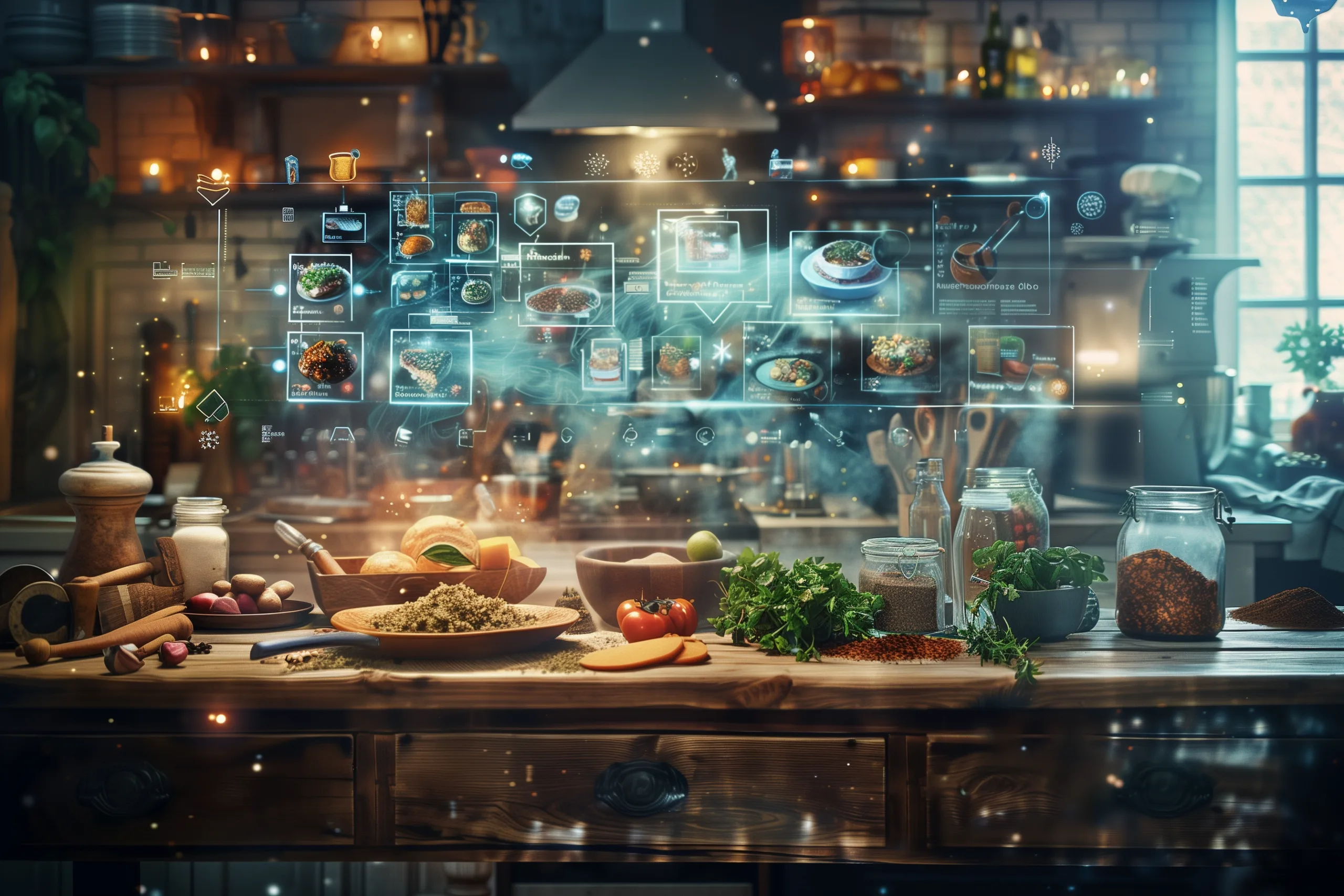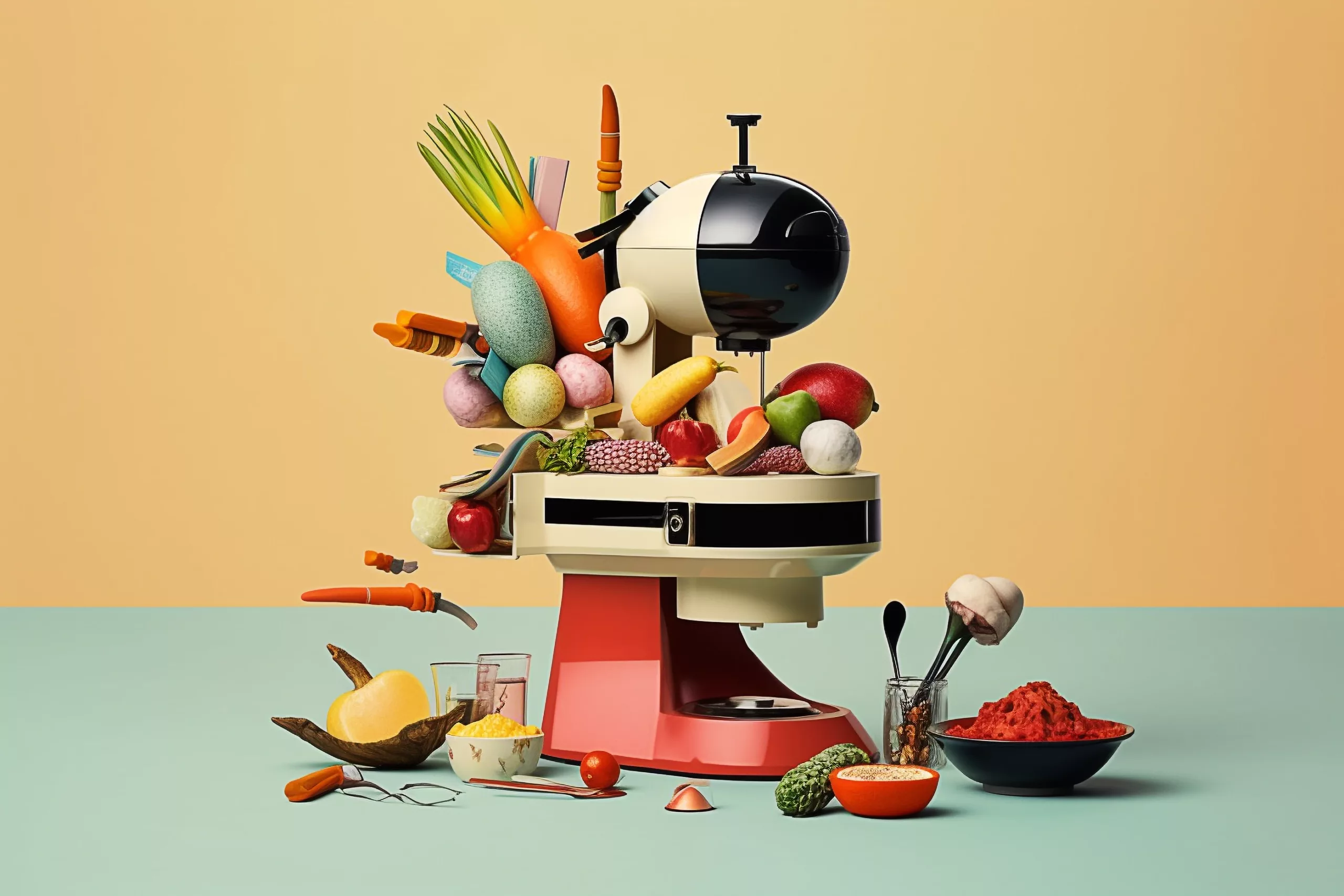published February 23, 2024 | 6 min read
In the heart of culinary innovation, a fascinating fusion is taking place. Artificial Intelligence (AI) is stepping into kitchens worldwide, not to replace the human touch, but to enhance it, marrying age-old cooking techniques with cutting-edge technology. This symbiosis opens up a realm of possibilities for culinary enthusiasts, chefs, and foodies alike, promising a future where tradition meets technology in every bite. “Fusion at the Frontier” delves deep into how AI is redefining the art of cooking by integrating with traditional methods to create dishes that are not only a feast for the taste buds but also a testament to the endless possibilities of culinary innovation.
The AI Culinary Assistant: Beyond Recipes
Artificial Intelligence (AI) is revolutionizing the culinary arts, transcending its initial function as a mere digital cookbook to become an indispensable ally in the kitchen. By delving into vast databases of historical culinary data, flavor profiles, and nutritional information, AI is redefining the approach to traditional cooking. It offers chefs intelligent recommendations for ingredient substitutions and flavor enhancements that honor the authenticity of classic dishes while weaving in modern nutritional awareness. This capability not only preserves the essence of traditional cuisine but also introduces an innovative nutritional perspective, striking a balance between heritage and health.

A chef and AI collaborate in a kitchen
AI’s prowess in analyzing culinary data enables it to unearth unique flavor pairings and suggest ingredient substitutions that respect the roots of traditional dishes while accommodating contemporary dietary preferences. Such innovations make traditional cuisines more accessible, allowing individuals with specific dietary needs—be it due to food intolerances, allergies, or lifestyle choices like veganism—to enjoy culturally significant meals without compromise. This democratization of culinary traditions ensures that the rich tapestry of global cuisines can be appreciated by a wider audience, bringing diverse cultural experiences to the forefront of modern dining.
Preserving Heritage, Embracing Modernity
In the quest for nutritional optimization, AI’s analytical capabilities extend to recommending alternatives that boost the health benefits of time-honored recipes. By suggesting healthier ingredients or those with a reduced environmental footprint, AI aids in enhancing the sustainability of cooking practices without diluting the original flavors that define traditional dishes. Furthermore, chefs are encouraged to venture into new culinary territories, armed with data-driven insights that foster a harmonious blend of creativity and tradition. This synergy between AI and conventional cooking methods not only safeguards culinary heritage but also adapts it to meet the evolving tastes and health consciousness of today’s diners.




AI interface reveals unexpected flavor pairings
Through its transformative influence, AI is crafting a bridge between the rich legacy of traditional cooking and the vibrant potential of contemporary culinary innovation. Its integration into the culinary domain is not merely a testament to technological advancement but a celebration of cultural diversity, personalization, and sustainability in cooking. As AI continues to enrich the culinary landscape, it heralds a new era of traditional cooking, enhanced by the precision and innovation that modern technology brings to the table.
The Global Kitchen: AI’s Role in Cross-Cultural Fusion
In the expansive arena of culinary arts, Artificial Intelligence (AI) emerges as a pivotal force in bridging diverse culinary traditions, heralding a new era of cross-cultural fusion. AI’s sophisticated data analysis capabilities enable it to sift through global databases, uncovering intricate flavor compounds and cooking techniques that span continents and cultures. This digital culinary savant assists chefs in harmonizing the distinct elements of various culinary traditions, crafting innovative dishes that embody the essence of multiple cultures. The result is a gastronomic tapestry that weaves together flavors in ways previously unimagined, offering diners unique taste experiences that transcend geographical boundaries.




AI-inspired dish that fuses Indian Curry with Japanese noodles
This fusion facilitated by AI does more than just amalgamate flavors; it serves as a conduit for cultural exchange and understanding. By recommending ingredient combinations that might not be traditionally associated, AI fosters a sense of curiosity and appreciation for the depth and diversity of global cuisines. For instance, it might suggest pairing the robust spices of Indian cuisine with the subtle textures of Japanese sushi, creating a dish that is as surprising as it is harmonious. In doing so, AI challenges the conventional boundaries of culinary art, encouraging chefs and diners alike to explore the rich narratives woven into the fabric of global food traditions.
Sustainable Cooking with AI
As the culinary world becomes increasingly conscious of its environmental footprint, AI stands at the forefront of sustainable cooking practices. Leveraging predictive analytics and machine learning, AI assists in minimizing food waste by optimizing ingredient usage and kitchen operations. It can forecast demand with high accuracy, allowing restaurants to prepare just the right amount of food, significantly reducing waste. Furthermore, AI’s ability to suggest sustainable alternatives to traditional ingredients is a game-changer for the industry. For example, it might identify locally sourced, less water-intensive crops that can replace more demanding ones, thereby not only conserving resources but also supporting local economies.




An eco-friendly kitchen
AI’s role in promoting sustainability extends to enhancing the traceability of food sources, ensuring that ingredients are ethically sourced and sustainably farmed. This technology can guide chefs toward using seasonal produce, which is often fresher and more flavorful, thereby elevating the quality of the dish while reducing the carbon footprint associated with transportation. Through these initiatives, AI is not just an ally in the kitchen; it’s a steward of the planet, helping to forge a future where culinary practices are in harmony with the environment.
The Future Plate: AI-Driven Culinary Trends
The culinary landscape is perpetually in flux, with trends and consumer preferences evolving at a rapid pace. AI is uniquely positioned to navigate this dynamic terrain, offering chefs and restaurateurs predictive insights that can shape the future of dining. By analyzing vast quantities of data, from social media trends to restaurant review sites, AI can identify emerging culinary trends before they reach the mainstream. This foresight allows culinary professionals to innovate proactively, creating dishes that not only meet but anticipate the changing tastes of their clientele.




A dynamic AI dashboard forecasts culinary trends
Moreover, AI’s ability to analyze dietary trends and nutritional data empowers chefs to tailor their offerings to the growing demand for health-conscious dining options. Whether it’s crafting gluten-free desserts that rival their traditional counterparts in taste and texture or developing plant-based dishes that satisfy even the most discerning meat lovers, AI is at the heart of culinary innovation. By integrating these trends into their menus, chefs can ensure their offerings remain relevant and appealing, attracting a diverse range of diners seeking both nourishment and novelty.
In conclusion, AI’s impact on the culinary world is profound, driving innovation in cross-cultural fusion, sustainability, and trend forecasting. As this technology continues to evolve, its potential to transform traditional cooking practices and redefine dining experiences is limitless. Through AI, the future of food is not just about what we eat, but how we create, understand, and interact with our culinary heritage and innovations.








